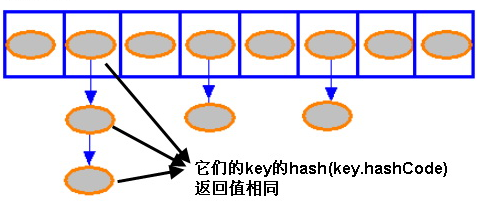由预备知识可以知道hashmap 的存储结构为:

(图像来自http://www.ibm.com/developerworks/cn/java/j-lo-hash/)
也是说:一个hashmap 内部含有一个Entity 类行的数组,这个数组中的元素都是Entity。实际上我们放入map 中的key 和 value 就对应一个Entity 对象,这个Entity 对象包含一个key、value、hashcode(key 的)和一个Entity 的引用,通过这个引用,Entity 可以形成一个链表。在图中,蓝色矩形方框代表数组,橙色椭圆代表Entity 对象。
注意HashMap 类不是线程安全的。
ConcurrentMap 主要的子类是ConcurrentHashMap。
原理:一个ConcurrentHashMap 由多个segment 组成,每个segment 包含一个Entity 的数组。这里比HashMap 多了一个segment 类。该类继承了ReentrantLock 类,所以本身是一个锁。当多线程对ConcurrentHashMap 操作时,不是完全锁住map, 而是锁住相应的segment 。这样提高了并发效率。
构造函数的分析:
[java] view plain copy print ?
- public ConcurrentHashMap() {
- this(DEFAULT_INITIAL_CAPACITY, DEFAULT_LOAD_FACTOR, DEFAULT_CONCURRENCY_LEVEL);
- }
/**
* Creates a new, empty map with a default initial capacity (16),
* load factor (0.75) and concurrencyLevel (16).
*/
public ConcurrentHashMap() {
this(DEFAULT_INITIAL_CAPACITY, DEFAULT_LOAD_FACTOR, DEFAULT_CONCURRENCY_LEVEL);
}
这是ConcurrentHashMap 的无参构造函数,可以看到默认大小为16,负载因子0.75,并发级别为16.
Put 函数的分析:
[java] view plain copy print ?
- public V put(K key, V value) {
- if (value == null)
- throw new NullPointerException();
- int hash = hash(key.hashCode());
- return segmentFor(hash).put(key, hash, value,false);
- }
/**
* Maps the specified key to the specified value in this table.
* Neither the key nor the value can be null.
*
* <p> The value can be retrieved by calling the <tt>get</tt> method
* with a key that is equal to the original key.
*
* @param key key with which the specified value is to be associated
* @param value value to be associated with the specified key
* @return the previous value associated with <tt>key</tt>, or
* <tt>null</tt> if there was no mapping for <tt>key</tt>
* @throws NullPointerException if the specified key or value is null
*/
public V put(K key, V value) {
if (value == null)
throw new NullPointerException();
int hash = hash(key.hashCode());
return segmentFor(hash).put(key, hash, value, false);
}
可以看出通过hash() 函数得到key 的哈希值,在得到相应的segment,在通过segment 存储Entity。
同时为了避免“检测再修改”(有条件线程安全参见[2])等并发问题,ConcurrentHashMap 提供了putIfAbsent(K key, V value) 方法,当key 不存在时,添加。(key 的存在靠两个条件,一个是key的hashcode方法,另外一个是key 的equal 方法)
优点:由于对对应segment 加锁,而不是锁定整个map,并发性得到了提高。能够直接提高插入、检索以及移除操作的可伸缩性。
缺点:当遍历map 中的元素时,需要获取所有的segment 的锁,使用遍历时慢。锁的增多,占用了系统的资源。使得对整个集合进行操作的一些方法(例如
size()
或
isEmpty()
)的实现更加困难,因为这些方法要求一次获得许多的锁,并且还存在返回不正确的结果的风险